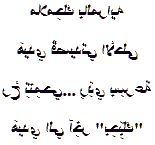Lebanese love poem
المرايه
ملامحِك بالمرايه
هَيدي قَصيدتي الأحلى
رحْ تِنمِحي... رِدِّي بسِرعة
هَيدي الي آخِر "بحِبِّك"

Conversion Old North Arabian script
𐪑𐪁𐪃𐪇𐪑𐪚𐪀
𐪃𐪁𐪑𐪃𐪂𐪋 𐪈𐪑𐪁𐪃𐪇𐪑𐪚𐪀
𐪀𐪚𐪕𐪚 𐪄𐪎𐪚𐪕𐪉𐪚 𐪑𐪁𐪑𐪂𐪁𐪑
𐪇𐪂 𐪉𐪌𐪃𐪂𐪚... 𐪇𐪕𐪚 𐪈𐪏𐪇𐪒𐪀
𐪀𐪚𐪕𐪚 𐪑𐪁𐪚 𐪑𐪍𐪇 "𐪈𐪂𐪈𐪋"
Romanization
Limreye
Malemhek bilmreye
Haidi 2assidte l2ahla
Rah tinmihi riddi bsir3a
Haidi 2ile 2ekher «bhibik»

→ French poem ←
Lebanese language
Here is my love poem translated into Lebanese (other names and those of the dialects: Iqlim-Al-Kharrub Sunni, Lebanese Arabic, Metuali, Mount Lebanon, Standard Lebanese, North Levantine, Syro-Lebanese, Druze, Beqaa, North Lebanese, Lebanese-Syrian, Jdaideh, Saida Sunni, Shii, South-Central Lebanese, South Lebanese, North-Central Lebanese, Sunni Beiruti, Levantine, Autonym: شامي (Shami)).
The Lebanese language which is the official language of Lebanon, is one of the varieties (that of the north-west) of Levantine, which groups together all the dialects of Greater Syria, a territory which includes present-day Lebanon, Syria, Jordan and Palestine.
It is difficult to know the number of speakers practicing this Semitic language, because many of the inhabitants of Greater Syria currently speak other and Mesopotamian varieties ... perhaps there are 6 million!
It should be noted that between the different variants of Levantine, the understanding remains perfect. This understanding among other-speaking populations goes even further, in particular because of the dissemination of the important artistic melting pot of Damascus, Beirut and Amman.
Shami is a language which comes from in the 7th century, and has mixed with the Semitic languages spoken in this region of the Levant.
We must not forget that before the 8th century and Islamization, this region will have been, Phoenician (the Phoenicians being Canaanites), Greek (Alexander the Great) and Roman. Later it will be the Turks and then the French who will influence it.
So, due to the many passages in this region of Greater Syria, if Syro-Lebanese has a large Aramaic background, it also has strong influences from Turkish, French and English.
While there is consensus to say that Lebanese is a variety of Arabic arrived in Lebanon with Islam and the Islamic conquests, some authors describe it more as a distinct Semitic language originating in particular from Aramaic.
Currently Lebanese people in addition to Lebanese language, speak French or English or the three languages.